- Home
- Paula McLain
A Ticket to Ride
A Ticket to Ride Read online
A Ticket to Ride
A Novel
Paula McLain
For Connor, Fiona, and Beckett
Well let me tell you ’bout the way she looked
The way she acted, the color of her hair
Her voice was soft and cool
Her eyes were clear and bright
But she’s not there
THE ZOMBIES
Contents
Epigraph
Prologue
Will It Go Round In Circles
Doctor My Eyes
All Day And All Of The Night
Diamond Girl
Drift Away
Can’t You Hear My Heartbeat
Nights In White Satin
Bennie And The Jets
Killing Me Softly
Get Off My Cloud
You Can’t Always Get What You Want
Sister Golden Hair
Tell Her No
Use Me
I’ll Take You There
We Gotta Get Out Of This Place
Stuck In The Middle With You
Slippin’ Into Darkness
Do You Believe In Magic?
Hold Your Head Up
Nowhere To Run
Everything I Own
Morning Has Broken
Acknowledgments
About the Author
Other Books by Paula McLain
Credits
Copyright
About the Publisher
PROLOGUE
It was August. For years it was August. There were pomegranates and wilting patio chairs and long afternoons that seemed seared open. There was heat like wet gauze and a high, white sky and music coming from everywhere at once: the Everly Brothers from Raymond’s scratchy hi-fi in the back bedroom; Steppenwolf from the transistor on the curb, where Timmy Romelin rubbed his father’s Corvair with a chamois cloth the color of a palomino pony; this or that done-me-wrong song sliding down the alley from the Olympic Tavern; and WKEZ on our cassette player, liquefying in the sun. Someone was leaving on a jet plane. Someone sang If loving you is wrong, I don’t want to be right until the words began to spill and drone like the sound the cicadas made over and over, all day, all summer. They “whirred,” that was the name for it, but to me it sounded more like water, like the cicadas were trying to boil themselves open.
We heard the cicadas all that summer, but their song seemed densest in August. The month that was like thirty-one Sundays stretched end to end to end. Sundays, because each of them moved slow as a heliotrope, because each was somehow empty and full at the same time. We woke late or woke early, ate blue-berries in a little cold milk or ate nothing. By eleven we were out on the lawn, working on our tans. Fawn wore a two-piece suit with pineapples and palm fronds, and green-tinted sunglasses with black frames. I wore a strapless solid blue maillot that cut hard into my ribs and hip bones, and my own arm over my eyes. We sucked sunflower seeds until our tongues pickled, drank iced tea out of narrow yellow Tupperware glasses, slathered baby oil everywhere we could reach. The sun buzzed. Dry grass scratched unreadable names into the backs of our thighs. Closing our eyes, we saw spongy, livid red against the lids. Tighter, and the red trembled, thinned, dissolved like a lozenge.
Nights we’d walk the neighborhood barefoot, warm air rubbing against our swinging arms. Sometimes we went to Turner Park to see who was there, or sat on the tire swings, passing a warm can of beer back and forth while our shadows climbed the sandpit and fell again. Sometimes we basked on the lawn at Queen of Peace, looking up into a hundred billion stars. Sometimes we went nowhere, just walked in long circles and sang. We were good at singing. Fawn’s voice was lower than mine, husky and unpeeled, like Janis Joplin’s or Janis Ian’s. I was more of a Shirelle, my head-voice clear, slightly nasal. Fawn and I liked all the same songs and could will them down from the stratosphere and through our speakers and then time would stop. Everything was exactly as it should be. Even I was perfect then.
I can’t explain it properly, except to say something in Fawn made something in me right again. With her I wasn’t the tragic girl who kept her asthma inhaler in her lunch box, who read too much and spent too much time alone and was sad all the time. I was pretty. I had things to say—smart, funny things. Boys followed me with their eyes when I walked by on the street, whether they wanted to or not. Everything was infinitely possible, ordained, even, as long as summer lasted, as long as Fawn was with me. Fawn was like a magic potion, a walking, talking human elixir who made everything all right even when it was dead wrong. This is why I couldn’t walk away—even when the summer went to shit, when I knew she was tugging me toward absolute disaster, when I knew Fawn would betray me as quick as look at me. Even then, I loved her. Even then, especially then, I needed her to go on breathing.
What we had, when I could bring myself to count it out later, was three months and change. A hundred and seven Kodachrome days spinning centrifugally toward the sun. It was 1973. I was fifteen and Fawn was sixteen and what was there to do but consult the weatherman and Wella Balsam and the radio gods? We had memories that seemed built particularly for storing song lyrics. We could sing along to anything that was playing, anything at all, or simply sway, holding the words under our tongues like melting sugar. It was summer in Illinois. There were cornfields and red-winged blackbirds and cicadas yortling from the trees and rooftops and the center of the invisible moon. Strings of perfect songs floated from the airwaves and into our hands, like balloons from a mail-order circus. Here, the songs seemed to be saying. All of this is for you. You can have it.
WILL IT GO ROUND IN CIRCLES
O’Hare International Airport was a little like a hospital: glaring linoleum, long hallways leading to other hallways, suspended white lights that seemed to shiver when I looked at them. Everywhere, people walked purposefully between points on a graph, pulling behind them stacked luggage sets or children, their faces hardening and sealing off like drying cement. Watching them, I felt as if I had never been anywhere or done anything worthy or daring or desperate enough. I wanted a destination and something or someone waiting there, holding wilting daisies or a piece of cardboard with my name on it; but we had come for Fawn—Uncle Raymond and myself—to collect this cousin, this stranger. I didn’t even own proper luggage, and Fawn was flying at that moment, buckled into a seat I imagined as static, a soft L shape that hung still while all of Illinois rushed toward it.
If nothing else, the girl had a fabulous name—Fawn Delacorte—round and silver as a serving spoon in a velvet-lined drawer. I had been saying it to myself for weeks, practicing it like a slogan or equation, a word problem. When Raymond told me that Fawn would be staying with us for the summer, he didn’t elaborate on the reasons. According to Fawn’s mother, Camille, the girl was at loose ends. Raymond knew I would be too, with school just let out and him working all day, so why not a companion? But why Fawn would voluntarily leave home to come to Illinois for three months, I found puzzling. A vacation spot or camp, sure, but Moline? And to relatives she had never met? It was a curious situation, but since I didn’t feel I could press Raymond to reveal more, I tried to focus on the windfall aspect of it. I would have a friend right there in the house for the whole summer. Days and days simply waiting to be filled, like the seats Raymond and I walked past on the way to Fawn’s gate.
When we arrived, the plane still hadn’t landed, so Raymond left me leaning against a wall-length window and walked off to make a phone call. I watched the black announcement board that said “Phoenix 469” for some minutes, but no change seemed imminent, so I gazed out at planes lumbering along the runway instead, their tiny front wheels looking underscaled and overburdened. At some arbitrary point they began to move faster and faster and then rose incongruously into
the air the way seagulls did, or objects being levitated. Nosing up and up, they arched into back bends or twisted sheerly to one side. Impossible. I watched takeoff after takeoff, thinking with each that this would be the time the bottom dropped out or the wings snapped clean off, like a mishandled model. But nothing terrible happened, at least not while I stood there.
Who were all these people and where were they going? When they peered out their oval windows, could they see houses and cars and people? Could they see me squinting to see the vanishing last of them? Or were they too busy, too impatient to be there already, wherever there was, like the people who hurried by me on the carpeted concourse, not talking unless they could also be moving: shifting a carry-on bag strap from shoulder to shoulder, digging for dimes for the phone, speeding up to board the moving walkway which counseled, in an electronic bug voice, care in exiting.
Beyond the walkway there was a circular bank of phones where Raymond stood with his back turned, conducting business or pleasure or listening to the weather lady repeat the daily forecast for all I knew. Since I’d come to live with Raymond in November, much of his life—or his person, rather—remained a mystery to me. When I went to school, he went to work. He came home dusty, showered, and then drank one beer while he made dinner, with the kitchen radio tuned to a station that played Three Dog Night and Roberta Flack. In the evenings, he read Time/Life books about the Civil War while I watched Iron-side or Mannix on the nineteen-inch black-and-white set in the living room. Then we went to bed, Raymond to his room at the back of the house, I to the makeshift, itchy green sofa in the living room where I’d watch a large carnivorous fish named Felix move back and forth in his tank, his mossy gills pushing mossy water in and out, in and out. The small house always seemed to double in size after Raymond turned in. It filled up with shadows the way Felix’s body filled with water; the way my own body filled up with a longing I couldn’t even name. Night stretched effortlessly in every direction. Was Raymond already asleep? Was the whole world sleeping?
Things were worse on weekend nights when Raymond went out, sometimes after a hushed phone call that he took in his room, sometimes prompted by his friend Ben at the door with a six-pack of Old Style beer. “Be good,” he’d tell me on these nights, but nothing more. I didn’t know where he went or what he did once there. I supposed he had a girlfriend or several, but he’d not yet had anyone over to the house. After he left, I’d turn up the volume on the TV, line the coffee table with magazines and paperbacks, fill a glass with too-sweet lemonade, all to convince myself I had plenty to do to occupy myself, but in fact the TV was just a timekeeper. McCloud then McMillan & Wife then Night Gallery as I waited for Raymond to come home. But even when he did and I was still awake, he’d just stand at the lip of the living room for a moment or two, his body rocking lightly to some private rhythm—a song he’d heard in the tavern or on the radio as he headed home—then he’d be off down the hall, trailing a “Sleep tight” behind him. I wanted us to be more comfortable with each other, more like family, less like roommates, and in time, I hoped that would happen. It was inevitable, wasn’t it? People couldn’t just live together indefinitely as strangers, could they? And now there would be Fawn in the mix—someone to keep me company, someone to talk to for the first time in years. I hoped she would become a real friend. In fact, I wanted this with such ferocity I could barely contain the feeling, and it scared me, wanting her or anything so much.
Over the loudspeaker, a woman’s clipped, efficient voice announced the arrival of Fawn’s flight. Raymond hung up the receiver and came to stand near me. Some minutes later, Fawn sailed out of the gate toward us, looking crisp and shiny, though the flight from Phoenix had been over three hours. Leaning into Raymond, Fawn kissed him quickly on the cheek. Then she turned to me, her brows furrowing as she took in the outfit I was regretting more and more as each second passed, the denim jumper with fat plastic buttons at the shoulders, the suntan pantyhose pooling at my knees, the box of peanut brittle I now wanted to toss into the nearest trash can. Fawn was clearly not peanut-brittle material.
“Hey,” Fawn said, “I brought you something.” She pulled from a brown paper bag a purse just like the one she carried. It was breath-mint white, the size of an apple, with a long leatherette strap. I reached for the purse shyly, afraid it would make, when I touched it, a buzzing like in the game Operation, the one the tweezers set off when your hand started to wobble as it went for the funny bone. The purse was too perfect, stiff and squeaky. I fingered the miniature zipper and thanked Fawn with so much feeling in my voice I was instantly ashamed.
As we left the gate, Fawn walked slightly ahead, her boot soles making a squeak-squish noise on the beige carpet. Raymond followed, loaded down with her bags, and I was farther back still, aware, mostly, of the way the new purse swung when I walked, small and empty and impeccable. It beat white time against my hip, and to that rhythm, surrounded by orange plastic chairs and herds of hurrying strangers, I felt the nudging of a second self coming awake. Here was my future, flexing its lanky legs, clearing its throat to the tune of hissing fluorescent lights and someone flatly calling Mr. Stern to the white courtesy telephone.
Raymond looked over his shoulder, said, “Come on now, Jamie.” Two sets of doors slid open with a pneumatic whoosh onto chaos: honking cabs and security whistles, cars glinting under the midday sun. The world was enormous and so bright that for a moment I felt stunned, an ant under a microscope. Beyond the parking lot of gleaming cars was the freeway; beyond the freeway, all of an Illinois summer.
“Come on, Jamie.” This time it was Fawn. I quickened my step and felt the purse twitch against my leg: a sparrow’s tiny heart or a time bomb. A ticket to ride.
DOCTOR MY EYES
Fawn Delacorte was my second cousin, the only daughter of Raymond’s cousin Camille, who’d married a French Canadian and moved from Bakersfield, California, to Phoenix in her early twenties, thus successfully vanishing from the family and all evidence of her former self, like a rabbit in another country’s hat. I never met Camille or her husband, Claude. My grandmother Berna had rarely spoken of them, and although she kept pictures of them in albums, they were the dustiest, most unloved books, the ones at the bottom of the upstairs hall closet, with bindings split and yawning. Inside, the paper was acid-bubbled, leprous. As I handled the pages, an unspoken question seemed to move back and forth between me and the gray faces of my estranged family, and that question was, Who are you?
I had lived with Berna and her husband, Nelson, since I was eighteen months old. They had a farmhouse ten miles outside of Bakersfield, which was built by somebody’s father’s father and looked it. Pocked yellow paint shed itself in long strips. The front porch was hangdog, and sets of four-paned windows pitched in and toward each other like tired eyes. It was a house to be old in, that seemed done-in by simply standing still, holding its bones together.
Some grandparents were older than others, I knew. Some worked, some played tennis in white ankle socks and terry cloth headbands. Mine played gin rummy and complicated dice games. They read Reader’s Digest and National Geographic and did the Daily Jumble in the Bakersfield Bee. They walked around the kitchen in house slippers that made shushing noises. They ate dinner at five thirty, in broad daylight. Each meal was preceded not by prayer but by pills, little ovals clicking inside the plastic days-of-the-week containers, and cloudy solutions of drinkable fiber in juice glasses.
It was odd and sad being a kid in Berna and Nelson’s house, odd being their kid, ostensibly, when they had already finished the better part of their lives. I knew that caring for me and worrying about me wore them out. They never said so directly, but they didn’t need to. I was a handful and I knew it.
I used to have spells—that’s what Berna called them. Mostly they involved not breathing, a crushing feeling descending on my chest like an anvil or an elephant and settling there until I thought I would simply cave in, like a faulty tunnel. Everyone assumed I was asthmatic, and altho
ugh the inhaler I carried couldn’t do much for the spells once one would start in earnest, knowing I had one with me comforted me. Mostly I didn’t even use it. Just reaching into my hip pocket, my school desk, my lunch box to flick the plastic cuff with my fingernail could make me feel like I had a better hold on things in general. When I was ten, a doctor we’d driven all the way to Los Angeles to see said I didn’t have asthma at all, that the spells were psychosomatic. Although this was unfathomable to me—the heaviness, the pressure, the breathlessness all felt so real, so absolutely convincing—I began to think Berna had always suspected it.
“It’s perfectly natural,” she tried to reassure me on the way home from the doctor’s office. “You’ve been through a lot.”
What she was referring to indirectly—the only way we ever really talked about it—was my mother’s running off when I was a baby. I didn’t have a father that anyone knew or would tell me about. I only had my grandparents and my uncle Raymond, who’d come around once a year or so, bringing wan-looking and misshapen stuffed animals he’d purchased at truck stops. Apparently, I now also had my not-quite-right-in-the-head head. Psychosomatic or not, I still had the spells and had no intention of letting my inhaler go. Thinking about losing it, in fact, was a sure way to bring a spell on.
Nelson, a pragmatist who believed you were only as sick as you let yourself be, said, “You just need to lighten up a little, Jamie.”

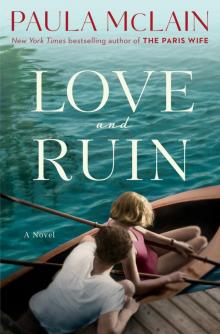 Love and Ruin
Love and Ruin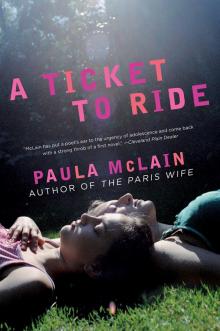 A Ticket to Ride
A Ticket to Ride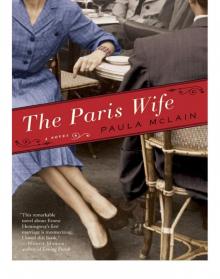 The Paris Wife
The Paris Wife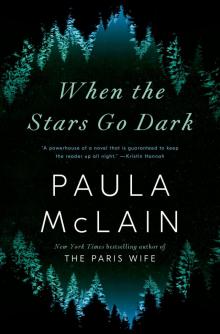 When the Stars Go Dark: A Novel
When the Stars Go Dark: A Novel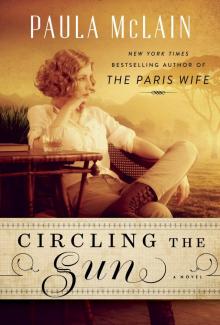 Circling the Sun
Circling the Sun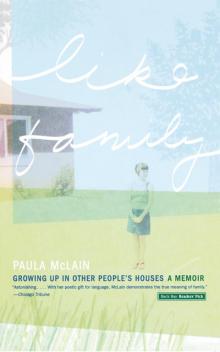 Like Family
Like Family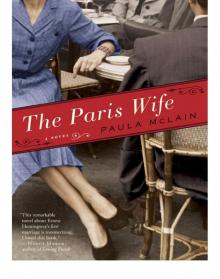 The Paris Wife: A Novel
The Paris Wife: A Novel